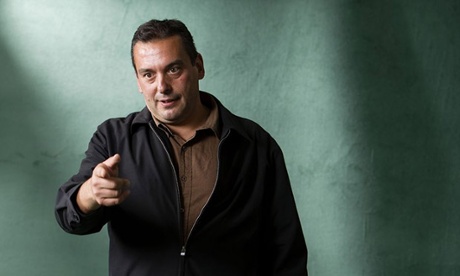
On Saturday morning, Christos Tsiolkas was interviewed in bravura style by David Marr about his books, particularly the latest, Barracuda. Describing him as a "giant" and noting how quickly the talk had sold out, Marr said: "I look upon these rows of respectable faces and I think with horror that you have read his words."
Tsiolkas's work is famed for its vigour, anger and eagerness to tackle sex, drugs and violence. In person however, he is hesitant and softly-spoken ("he talks quietly and writes loud," explained Marr). At the outset, Tsiolkas seemed stumped when asked to explain the hatred expressed and analysed in his work. He finally decided that rage was a better term, and that writing had been a way of diverting his rage about "being trapped in this body, my sexuality, class, my linguistic separation from my family." Tsiolkas is working class and gay; his parents are Greek immigrants; his aunts are illiterate and mum doesn't speak much English – though he says that his father had great storytelling abilities, and was steeped in European folklore, a believer in vampires, curses and the evil eye. Tsiolkas said that the fact that his parents couldn't read English gave him the freedom to write. He was also inspired by reading books like Jean Genet's The Thief's Journal in his early teens, which he described as "angry, beautiful, sublime and difficult."
Marr pointed out that Tsiolkas often writes about children's obligation to their parents, an underexplored subject in fiction. The author replied that while he couldn't live by his parents' codes, he would never turn away from them because his life – which they didn't understand or approve of – was nevertheless made possible by their sacrifice. As the conversation turned to the search for masculine identity, Tsiolkas remembered that as he was about to go to university, his uncle slapped him "in a friendly way" and told him "We're very proud of you, but don't forget where you came from."
This contradicted the advice from another influential figure in Tsiolkas's life, a drag queen called Lady Constantine, who took him under her wing when Tsiolkas was 16. Lady Constantine, who the author remembered had a great record collection which included Thelonius Monk alongside the inevitable disco classics – said "you don't have to be bound by your penis, your sexuality, your class – you can reinvent yourself." Tsiolkas candidly admitted that he is caught between admiring that attitude and the stoicism and camaraderie of the men of his father's generation, and his writing comes from that contradiction.
Marr asked him about the sex in his writing, and whether writing about sex is more enjoyable than the act itself. Tsiolkas laughed, and said that while it would never beat his best sexual experinces, "sometimes writing sex is better than some of the sex I've had." In a moment that seemed impressively candid to me (though some will regard it as too much information), Tsiolkas said that the best way of writing sex scenes is to "do the first draft, orgasm, and then start editing. You can be objective post-orgasm."
Joking that it was an epitaph to be proud of, Marr said that Tsiolkas is the best writer about masturbation in contemporary literature (it figures a lot in Barracuda, including a pivotal scene). "We do it a lot more than we own up to," said Tsiolkas. "The drive to get off is so intense." When he was a teenager, he explained, "I couldn't admit to any of the boys I hung out with that I wanted to fuck 'em, so my erotic life was in my imagination and in the body."
Ultimately, Marr said, Barracuda is about how to be a good man. Though the main character, Danny, descends into hell, his return from hell involves a literary awakening. Tsiolkas re-read some of the novels that Danny discovers in the book, like Dickens, and rediscovered that great novels can "illuminate a life" – an unfashionable notion which he had previously held in suspicion. Reading those books, "I swooned again – I had that moment of falling in love with reading again. The books give Danny a chart to navigate what it is to be good."
An illuminating session ended with Tsiolkas dropping the bombshell that his next novel will be very different – it's about the life of St Paul.

